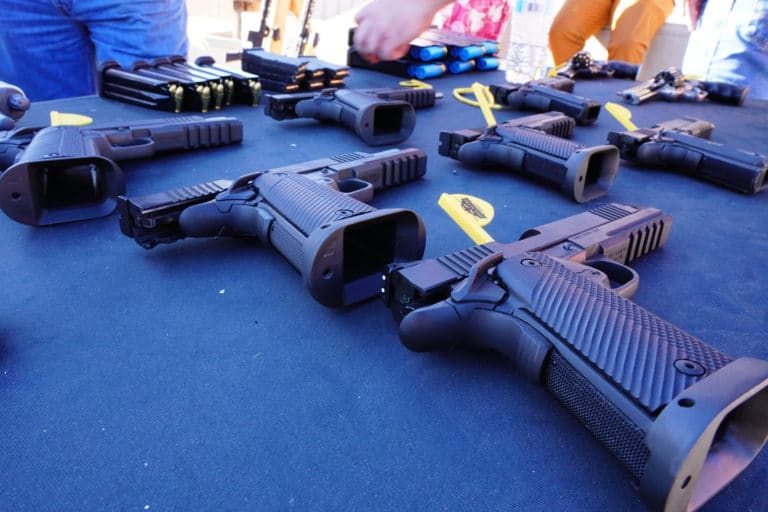In an age of unprecedented global exchange brought about by technology like the internet and social media, the latest American cultural export to gain ground abroad may be civilian gun ownership.
In both rhetoric and policy, political leaders and advocates in several places outside the US have recently taken a second look at allowing their citizens to arm themselves.
Just this week, Israeli National Security Minister Itamar Ben Gvir provided a public update on his government’s push to expand civilian gun rights in the wake of the October 7th attacks by Hamas. He announced they’ve received more than 236,000 new applications for firearms licenses since he loosened permitting requirements following the attack—an amount equal to the applications received over the prior 20 years combined. He argued this was a positive development and called upon the people of Israel to embrace firearms in terms that echo American gun-rights advocacy.
“I call on all those who are eligible — be patient with the backlog, and go get armed,” he said. “Guns save lives.”
This emphasis on guns as a life-saving tool in the hands of private citizens is one that American firearms advocates have advanced throughout the country’s history, particularly as the debate over gun laws has been a consistent feature of our political life. To see it in a country without a Second Amendment or corresponding tradition of widespread civilian gun ownership is noteworthy, to say the least.
Isreal’s embrace of armed civilians mirrors that of the Ukranian government and its push to change its laws to make it easier for civilians to own guns in the face of the Russian invasion. The country’s legislature passed a law expanding access to firearms and codifying a right to self-defense prior to Russia’s invasion last year, and its military began handing out rifles to any civilians willing to take up arms shortly after the invasion began. Some Ukrainian officials, including the country’s former top law enforcement official, have since said they hope to make widespread civilian gun rights permanent even after the war.
“For me, this is reason to believe that Ukrainians can be allowed to buy and store weapons to protect their own homes,” Denys Monastyrsky, the late Ukrainian Minister of Internal Affairs, said. “The post-war call to surrender weapons will not be heard, as most Ukrainians will continue to feel unsafe.”
Back in Israel, other supporters of the government’s decision to loosen its gun laws noted that support for more comprehensive civilian gun-carry rights was building even before the October 7th attacks. Simcha Rothman, Chair of the Israeli Knesset’s Constitution, Law, and Justice Committee noted the potential for loosened gun restrictions to be a lasting change. He pointed to past defensive gun uses by public gun carriers as a reason for that change, another prominent feature of the American gun debate.
“In the past, law-abiding citizens with handguns stopped and prevented many terrorist attacks in Israel,” Rothman recently told The Reload. “There are many, many terrorists that were killed on the site by law-abiding citizens carrying a gun. They didn’t wait for the law enforcement. That saved many, many people. So, every spike in terror was always bringing motivation.”
This embrace of public gun carry, already a common and relatively popular practice in the United States, has also emerged among populist, right-wing politicians in Latin America.
Ecuadorian President Guillermo Lasso instituted new reforms earlier this April to allow “the possession and carrying of guns for civilian use in personal defense” in response to a near-quintupling of the country’s murder rate since 2016. Those changes came on the heels of more than a dozen piecemeal gun law reforms instituted by former Brazilian President Jair Bolsanaro, who argued that “good citizens” should be allowed to defend themselves and that “an armed populace will never be enslaved.” Those moves saw private gun ownership in the country increase sixfold even as murder receded. His left-wing successor, Luiz Inácio Lula da Silva, has since rolled back many of those reforms in a stated pursuit of “a disarmed country.”
It’s worth noting that all of the aforementioned shifts in rhetoric and policy were directly precipitated by acute security threats, either real or perceived. In the cases of Ukraine and Israel, the shifting stance on civilian gun ownership was brought about by invasions and ongoing threats posed by an active war. The Latin American shifts, meanwhile, were in response to more general lawlessness and the risks posed to civilians by violent criminals.
Elsewhere, however, the adoption of American-influenced gun advocacy appears to be spreading without an obvious catalyst. The outlet Euronews. documented in August the rise of Firearms United, a pan-European firearms lobby claiming to represent more than 100 million gun owners on the continent who explicitly want to see gun laws in the EU brought more in line with the United States. And the way some of its members—at least those willing to speak with the outlet—talk about the issue will sound very familiar to anyone plugged into American gun politics.
“Civilian gun ownership can make authoritarian drifts very difficult because it gives people the ability to resist,” Andrea Favaro told Euronews. He later added that “being able to carry a firearm deters violent crime, especially those that by nature are committed against victims of opportunity.”
Another gun-rights advocate with the group Firearms UK told the outlet that gun ownership is “the measure of a free and open society and people’s ability to live their life on their terms in pursuit of their happiness.”
To date, however, the group hasn’t had much success in getting the EU to align itself with a more Americanized conception of gun rights.
On the policy front, while there have been some instances of gun law loosening in certain countries, none have to come anywhere near the level of liberalization in the US. Or even, really, US states with the most gun restrictions.
And, as in America, the debate over guns is ongoing in all of these nations. In some cases, such as Brazil, efforts to loosen gun laws have been met with political backlash and a subsequent reversal after the government changed hands.
However, how these policy changes have been discussed has undeniably taken on an American-tinged rhetorical style, linking firearms to freedom and self-preservation in places where gun ownership has not traditionally been viewed that way. American gun culture has long been an outlier on the world stage. If this trend continues, that could change.






